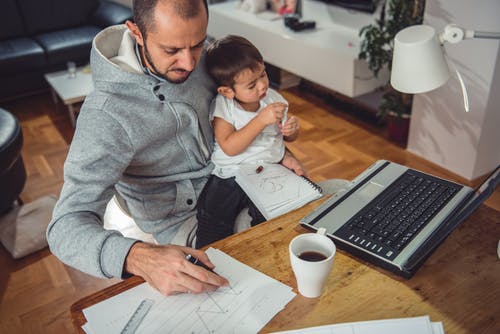Parents: The Future Of Work Is Here
Posted by Alexandra Lamb
Futurist Dr. Parminder K. Jassal from the Work + Learn Futures Lab tells us that the future isn’t something we need to predict or dream up – its constantly being signaled to us if we just observe how people are behaving.
And it’s not just early adopters – it’s the ordinary person: the Man on the Bondi tram, or in modern terms, the Woman on the Zoom call.
What do they crave? What do they use? What do they reject? Who do they love? And lately, in a time of social isolation – how is their attention spent?
As so many offices move to remote work in the time of COVID-19, our future of work is becoming common reality. Home office set-up businesses have skyrocketed in valuation, and everyone’s talking about how to make online meetings effective (sticky-notes with green smiley faces or red frown faces, anyone?).
However a significant consequence of this shift to home-working that we haven’t seen discussed, is the fact that school is out too… many workers aren’t just perched at their kitchen tables now, happily getting their risk contingency plans into play and wondering how to run remote lunch’n’learns (which just became even more cost effective as a learning hack – b.y.o. sandwich from your own kitchen!) – they’re often doing it with a kid, or perhaps three, also around said table.
Some fortunate families have Grandparents, Neighbours, a Spouse, Co-Parent, or in-home childcare to call on – but many modern families are made up of either a single working parent, or two working parents, with kids in full-time childcare or school, and perhaps elder or other family members to take care of.
Even where strong social & community bonds exist, many families find themselves operating independently in the home now, home schooling and caring, running daytime and nighttime shifts, getting creative with meals and activities, while working full time for companies who expect heightened productivity to overcome the crisis.
Kids are not uncommon on conference calls now – today I was on a call, and after a characteristic pause in discussion (“…Jim? Are you there Jim? You’re on mute…”) Jim piped in with: “sorry, I was changing a diaper, and thanks to my Wife for confirming the question…” There was no animosity, or even a hint that this was unprofessional – this is todays working world.
Firstly, Dads are on the scene. Integrating children into the work-world was always going to be normalized by men, and COVID-19 is just the catalyst to make it happen.
I’m not going to launch into a full discussion about why Mum’s haven’t made this work-life integration happen up to this point – we have our own dynamics to address in the workplace, invisible forces that make it hard for the ‘Parent’ identity to fully come to the forefront in many cases, resulting in higher instances of part time work to keep the family and work lives neatly segregated.
But now with kids (and pets, and lawnmowers, and oven buzzers!) casually coming in and out of our conference calls (and in some cases giving feedback – “Dad, you speak too fast on your calls!”) we’ve arrived at a new normal.
Sometimes kids cry and squeal, sometimes they ask urgent-not-so-urgent questions, they bang keyboards and delete calendar events, or show grubby faces atop dinosaur PJ’s on-screen, sometimes they demand our attention when we’d ideally be listening or speaking or otherwise being ‘professional’. We can’t necessarily keep this scene going forever – but crisis creates a new concept of how we operate as whole people.
We appreciate our Colleagues in a whole new light – in some cases they’re more relatable through their kids and the lens of the decoration choices they have made in their spare room.
Secondly, this demands a new concept of professional development. Are we taking on skills from this family-world that we can apply back into the workplace? Of course!
Are they validated now, having been brought into focus by this new work reality? Yes! Do we have a better view now of what really matters? Yes – a market shock and intensive time with family will do that. Prioritisation takes on a profoundly new meaning as a skill. Our productivity shifts – we find new ways of being effective, getting our outcomes as directly as we can.
We might sacrifice some elegance or complexity in our work, but we drive for results in this new context.
We polish our communication out of necessity – reaching out, finding new ways to inform and be informed by Colleagues, and dropping those nice-to-have calls that we’d been questioning for some time.
When we turn the lights back on in our offices – which is going to happen – we bring all these skills from our homes back into our operations.
Keep this grit and self-awareness alive – we’re leaner and more proficient than we were in our fair-weather days – COVID-19 has forced us into a new era of learning and up-skilling.
The future of work isn’t about WHERE we work, it’s about how we shift our minds to pay attention to the most important things, integrate our skill-sets across the various parts of our lives, and create the true inclusion we want to see in our offices.
COVID-19 isn’t a distraction – it’s a tragedy that has shifted our focus onto family, and allows us to emerge with new and better work practices, where Parents become an included party.

